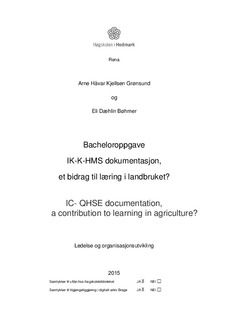IK-K-HMS dokumentasjon, et bidrag til læring i landbruket?
Bachelor thesis
Permanent lenke
http://hdl.handle.net/11250/286199Utgivelsesdato
2015Metadata
Vis full innførselSammendrag
I denne bacheloroppgaven har vi gjort en kvalitativ undersøkelse; om IK- K- HMS dokumentasjon bidrar til læring i landbruket. Hensikten med undersøkelsen var å gi innsikt i hvordan og hvilke type læring dokumentasjonsarbeidet gir.
Bakgrunnen for undersøkelsen ligger i vår grunnleggende antakelse at; IK- K- HMS dokumentasjonen som blir gjennomført i landbruket, er i stor grad basert på plikt og krav fra myndighetene og varemottakere, og at man dermed har liten læringseffekt av dokumentasjonen. For å få svar på problemstillingen har vi gjennomført dybdeintervjuer av fire ulike bønder på Østlandet.
Undersøkelsen er oppbygd rundt et teoretisk rammeverk som er tilpasset problemstillingen og vår grunnleggende antakelse. Vi har benyttet teori og forskning om læring og IK- K- HMS dokumentasjon.
Resultatene bekrefter at mye av dokumentasjonsarbeidet gjennomføres av plikt, her følges minstekravet opp. Dette gir i liten grad læring, i beste fall enkeltkretslæring. Det er også deler som gjennomføres av egeninteresse, disse områdene er de som er mest nyttige for bonden, her dokumenteres det også ofte utover minstekravet. Disse områdene relatere seg i stor grad til bondens verdi som er funnet å være økonomi. Faglig nytte og bondens verdi koblet er det som vi har funnet å gi dobbeltkretslæring.
Våre anbefalinger retter seg mot de ansvarlige for dokumentasjonssystemene: Bedre opplæring og tilrettelegging vil forenkle arbeidet med dokumentasjon og bidra til høyere kvalitet i det arbeidet som gjøres. English: In this bachelor thesis we have made a qualitative survey about how IC- QHSE (IK-K-HMS) documentation contributes to learning in agriculture or not. The purpose of the study was to provide insight into whether, how and what type of learning documentation work provides.
The reason for the survey is based on our basic assumption that; IC- QHSE documentation is carried out in agriculture mainly based on duty and demands from the government and care recipients, and that we therefore have little learning effect from the documentation.
To be able to answer the research question, we conducted in-depth interviews of four different farmers in eastern part Norway.
The survey is structured around a theoretical framework that is adapted to the research question and the basic assumption. We have used theory and research about learning and IC- QHSE documentation.
The results confirm that much of the documentation work is carried out by duty, and therefor only comply with the minimum requirements. This provides a small degree of learning, at best single loop learning. There are also parts that are carried out by self-interest, these areas are those that are most useful for the farmer, and are often documented beyond the minimum requirement. These areas are highly related to the farmer's value which is found to be economics. Professional advantage and farmer’s value connected together is what we have found to provide double loop learning.
Our recommendations are aimed at those responsible for the systems: Better training and facilitation will simplify the work with documentation and contribute to higher quality of the work.
